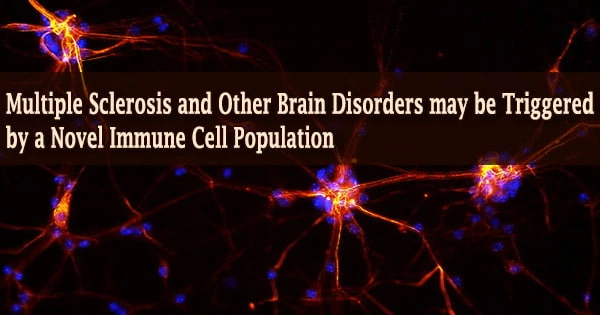According to a new study by Weill Cornell Medicine and New York-Presbyterian researchers, a subset of immune cells that ordinarily guard against inflammation in the gastrointestinal tract may have the opposite impact in multiple sclerosis (MS) and other brain inflammation-related disorders. The findings suggest that inhibiting these cells’ activity could be a novel therapeutic approach for such illnesses.
The researchers were looking at a type of immune cell called group 3 innate lymphoid cells (ILC3s), which help the immune system tolerate beneficial microorganisms and control inflammation in the intestines and other organs throughout the body, according to their findings published in Nature on 1st December 2021.
They uncovered a distinct subset of these ILC3s that circulate in the bloodstream and can infiltrate the brain, where they, to their surprise, do not quench inflammation but rather exacerbate it. Inflammatory ILC3s were discovered in the central nervous system of mice with a disease that mimicked MS, according to the researchers.
Rather than limiting the immune response, this subset of ILC3s prompted another type of immune cell, T cells, to assault myelinated nerve fibers, resulting in MS-like symptoms. Similar inflammatory ILC3s were found in the peripheral blood and cerebrospinal fluid of MS patients, according to the study.
Dr. Gregory Sonnenberg, senior author and member of the Jill Roberts Institute for Research in Inflammatory Bowel Disease at Weill Cornell Medicine, is an associate professor of microbiology and immunology in medicine in the Division of Gastroenterology and Hepatology said: “This work has the potential to inform our understanding of, and potential treatments for, a broad variety of conditions involving T-cell infiltration of the brain.”
MS affects about two million people around the world. Alzheimer’s and Parkinson’s illnesses are two other ailments that involve persistent brain inflammation and affect tens of millions of people.
The infiltration of these inflammatory ILC3s to the brains and spinal cords of mice coincides with the onset and peak of disease. Further, our experimental data in mice demonstrate these immune cells play a key role in driving the pathogenesis of neuro-inflammation.
John Benji Grigg
Neuroinflammation appears to grow naturally with age and is a major role in the age-related cognitive loss, and inflammatory T-cell responses in the brain have recently been linked to neurological symptoms linked to SARS-CoV-2 infection.
ILC3s in the gut operate as sentinels and immunological regulators, decreasing inflammation, including inflammatory T-cell activity, and warding against cancer, according to current studies.
They looked at the roles of ILC3s in the brain in the new study and discovered that, contrary to their expectations, ILC3s are not generally present in the brain under normal conditions but can infiltrate the brain from the bloodstream during inflammation. They have pro-inflammatory rather than anti-inflammatory effects when they enter the central nervous system.
The researchers demonstrated that these inflammatory ILC3s in the brain serve as antigen-presenting cells, displaying bits of myelin protein, the main ingredient in the insulating layer around nerve fibers, to T cells, prompting them to attack myelin, resulting in the nerve damage that causes disease symptoms. In areas of active inflammation and nerve injury in the mouse brains, the inflammatory ILC3s were discovered in close contact with T cells.
“The infiltration of these inflammatory ILC3s to the brains and spinal cords of mice coincides with the onset and peak of disease,” said first author John Benji Grigg, a Weill Cornell Graduate School of Medical Sciences doctoral candidate in the Sonnenberg laboratory. “Further, our experimental data in mice demonstrate these immune cells play a key role in driving the pathogenesis of neuro-inflammation.”
The researchers discovered that by deleting a critical component called MHCII from the ILC3s, which is normally employed in the antigen-presenting process, they were able to avoid MS-like pathology in the animals. This removal effectively limits the cells’ capacity to activate myelin-attacking T cells.
“Despite our very best disease-modifying therapies for MS, patients continue to progress, and since disease onset is early in life, they face the prospect of permanent physical and cognitive disability,” said co-author Dr. Tim Vartanian, professor of neuroscience in the Feil Family Brain and Mind Institute at Weill Cornell Medicine, chief of the division of multiple sclerosis and neuro-immunology and a professor of neurology in the Department of Neurology at Weill Cornell Medicine and New York-Presbyterian/Weill Cornell Medical Center.
The discovery of antigen-presenting inflammatory ILC3s in the central nervous system of persons with MS provides a new strategic target for preventing nervous system harm.
Finally, the researchers revealed that ILC3s found in other bodily regions may be regulated to counteract the activity of brain-infiltrating T cells, thus avoiding MS-like illness in mice.
This work was completed in close collaboration with Dr. Ari Waisman, Director of the Institute for Molecular Medicine at the University Medical Center of Johannes Gutenberg University Mainz, where the researchers built on prior research demonstrating that there are gut-resident ILC3s that display antigens to T cells in a slightly different way to promote T-cell inactivity, or “tolerance.”
By experimentally exposing these tolerance-inducing intestinal ILC3s to myelin, the researchers were able to prevent neuroinflammatory T-cell activity and the development of MS-like illness in mice.
“The work therefore points to the possibility that MS and potentially many other inflammatory conditions could someday be treated either by directly inhibiting the activity of inflammatory ILC3s that infiltrate the brain, or by targeting self-antigens to the intestinal ILC3s that promote tolerance in other tissues,” Dr. Sonnenberg said.





